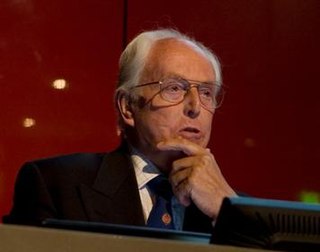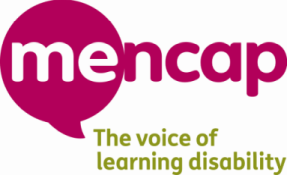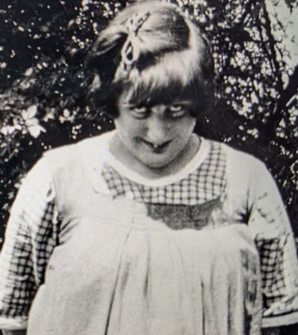
Brian Norman Roger Rix, Baron Rix, was an English actor-manager, who produced a record-breaking sequence of long-running farces on the London stage, including Dry Rot, Simple Spymen and One for the Pot. His one-night TV shows made him the joint-highest paid star on the BBC. He often worked with his wife Elspet Gray and sister Sheila Mercier, who became the matriarch in Emmerdale Farm.

Johanne Whiley-Morton, better known by her professional name Jo Whiley, is an English radio DJ and television presenter. She was the host of the long-running weekday later weekend Jo Whiley Show on BBC Radio 1. She currently presents her weekday evening Radio 2 show. She is also the main presenter for the BBC's Glastonbury Festival coverage.

The Royal Mencap Society is a charity based in the United Kingdom that works with people with learning disabilities.

Nicola Jane Chapman, Baroness Chapman was a British peer and disability rights activist.

Leonard Cheshire is a major health and welfare charity working in the United Kingdom and running development projects around the world. It was founded in 1948 by Royal Air Force officer Group Captain Leonard Cheshire VC.

Intellectual disability (ID), also known as general learning disability, and formerly mental retardation, is a generalized neurodevelopmental disorder characterized by significant impairment in intellectual and adaptive functioning that is first apparent during childhood. Children with intellectual disabilities typically have an intelligence quotient (IQ) below 70 and deficits in at least two adaptive behaviors that affect everyday living. According to the DSM-5, intellectual functions include reasoning, problem solving, planning, abstract thinking, judgment, academic learning, and learning from experience. Deficits in these functions must be confirmed by clinical evaluation and individualized standard IQ testing. On the other hand, adaptive behaviors include the social, developmental, and practical skills people learn to perform tasks in their everyday lives. Deficits in adaptive functioning often compromises an individual's independence and ability to meet their social responsibility.

United Response is a charity operating in England and Wales, providing a range of support and services for around 2,000 people with learning disabilities, mental health needs, or physical disabilities.

ARC Association for Real Change is a UK membership organisation, which supports providers of services to people with a learning disability.
Special educational needs (SEN), also known as special educational needs and disabilities (SEND) in the United Kingdom refers to the education of children who require different education provision to the mainstream system.
Disability abuse is when a person with a disability is abused physically, financially, sexually and/or psychologically due to the person having a disability. This type of abuse has also been considered a hate crime. The abuse is not limited to those who are visibly disabled or physically deformed, but also includes those with learning, intellectual and developmental disabilities or mental illnesses.
Enable Scotland is a member-led charity based in Scotland that supports people who have learning disabilities and their families. Founded in 1954 they campaign for equal rights for people who have learning disabilities and also provide personalised services to assist them with various problems in their lives. Typical difficulties addressed include access to employment, transportation, support for families, and help with finances. Enable Scotland also run the Scotland Employers Award. Theresa Shearer FRSE is the charity's current Chief Executive.
Heavy Load were an English punk rock band, described by The Sunday Times in 2009 as "possibly the most genuinely punk band touring today".
For many elderly carers of a relative who has a learning or other disability, future planning is an issue. The population of older parents who have children with a learning disability is growing and many of their children are likely to outlive them. In many cases the caring role can span up to seven decades, ending only with their death. Governments and other service providers cannot ignore the pressing needs of this population and their parent and sibling carers. In most countries, family carers provide inexpensive care for a person with a learning disability and other disabilities. This trend is set to continue in England. Demographic changes and the health needs of these two growing populations must be considered against government policy constraints and limited in-home and external care options in order to avoid a crisis. The consequences of not supporting these family carers will lead to crisis management, increase in distress and care giving burdens, and increased spending on unsuitable crisis placements. Housing and financial guidance are issues for caregivers.

Hollybank Trust is a registered charity and care home, specialising in caring for children with multiple and profound disabilities. Hollybank school was one of the first registered schools for disabled children to be built in the North of England. It employs over 500 full and part-time staff at locations across Yorkshire, in Mirfield, Halifax, Holmfirth, Barnsley and South Kirkby.

Nerissa Jane Irene Bowes-Lyon and Katherine Juliet Bowes-Lyon were two of the daughters of John Herbert Bowes-Lyon and his wife Fenella. John was the brother of Queen Elizabeth the Queen Mother, thus his two daughters were the maternal first cousins of Queen Elizabeth II and Princess Margaret, sharing one pair of grandparents, Claude Bowes-Lyon, 14th Earl of Strathmore and Kinghorne, and Cecilia Bowes-Lyon, Countess of Strathmore and Kinghorne.
Innovate Trust is an independent charity registered in the UK. based in Cardiff operating across South East Wales. Innovate Trust provides supported living services to adults with learning disabilities, mental health conditions, physical disabilities or sensory impairments in Cardiff, the Vale of Glamorgan and Rhondda Cynon Taff.
The 2018 Queen's Birthday Honours are appointments by some of the 16 Commonwealth realms of Queen Elizabeth II to various orders and honours to reward and highlight good works by citizens of those countries. The Birthday Honours are awarded as part of the Queen's Official Birthday celebrations during the month of June. The Queen's Birthday Honours for the United Kingdom were announced on 9 June; the honours for New Zealand were announced on 4 June and for Australia on 11 June.
Ayshah Tull is a British presenter and journalist at Channel 4 News. Formerly, she was at the BBC working mainly for the children's news programme, Newsround. Tull has also presented for BBC Sport along with having her reports appear on BBC Breakfast, World TV, and the Victoria Derbyshire programme.
The 2020 New Year Honours are appointments by some of the 16 Commonwealth realms to various orders and honours to recognise and reward good works by citizens of those countries. The New Year Honours are awarded as part of the New Year celebrations at the start of January and were officially announced in The London Gazette on 27 December 2019. Australia, an independent Realm, has a separate honours system and its first honours of the year, the 2020 Australia Day Honours, coincide with Australia Day on 26 January.









